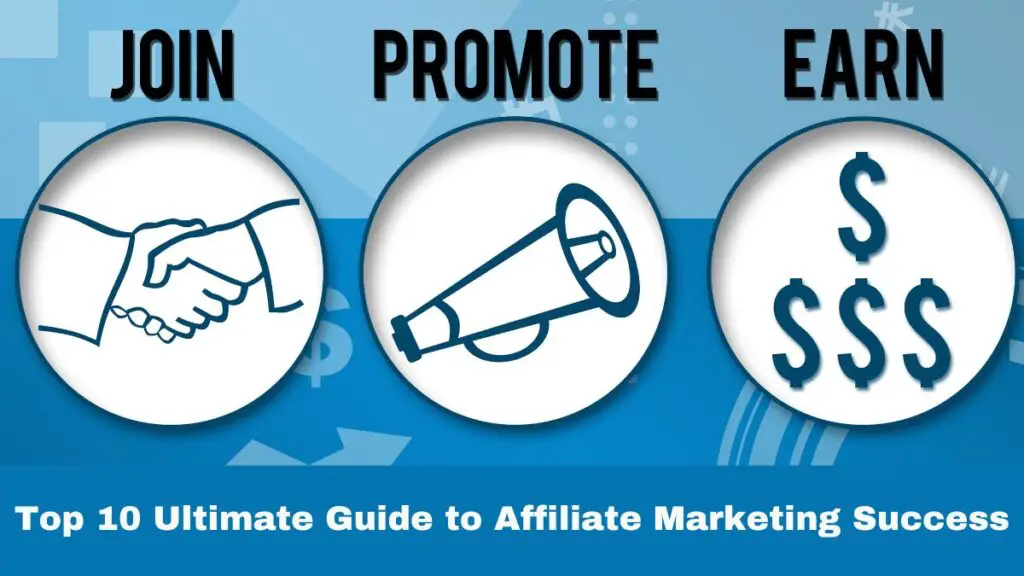Top 10 ultimate guides to affiliate marketing success. Affiliate marketing is a powerful tool for businesses looking to generate sales and increase their online presence. If you’re interested in launching an affiliate marketing program or looking to improve the performance of your existing program, there are a number of key strategies that can help you achieve success.
Are you ready to take your affiliate marketing game to the next level? Look no further because “The Ultimate Guide to Affiliate Marketing Success” is here to equip you with the knowledge, strategies, and tips you need to thrive in this competitive industry. This comprehensive guide will walk you through the top 10 ultimate guides to affiliate marketing success, covering everything from selecting the right niche to optimizing your campaigns for maximum profitability. Whether you’re a beginner or a seasoned affiliate marketer, this article is your roadmap to achieving success in the world of affiliate marketing.
Understanding Affiliate Marketing
Affiliate marketing is a popular and effective way to earn income online. It is a performance-based marketing strategy where individuals or businesses promote products or services of other companies in exchange for a commission. In simple terms, you earn a commission for every sale or referral that is generated through your affiliate links.
What is affiliate marketing?
Affiliate marketing is a partnership between an affiliate (you) and a merchant (the company whose products or services you are promoting). As an affiliate, your role is to promote the merchant’s products or services through various marketing channels such as websites, blogs, social media, and email marketing. When a customer makes a purchase or completes a desired action through your unique affiliate link, you earn a commission.
How does affiliate marketing work?
The process of affiliate marketing involves a few key steps. First, you sign up to become an affiliate for a particular company or join an affiliate network. Once approved, you receive a unique affiliate link that you can share with your audience. When someone clicks on your affiliate link and makes a purchase or completes a desired action, the merchant tracks it back to you and you earn a commission.
Benefits of affiliate marketing
Affiliate marketing offers numerous benefits for both affiliates and merchants. For affiliates, it provides a flexible and scalable income source without the need to create and manage their own products. It also allows you to leverage the authority and reputation of established companies. For merchants, affiliate marketing serves as a cost-effective way to market their products or services and reach a wider audience through the affiliate’s promotional efforts.
Types of affiliate marketing programs
There are various types of affiliate marketing programs that you can participate in. Some common types include pay-per-sale, where you earn a commission for every sale you generate; pay-per-lead, where you earn a commission for every lead or sign-up you generate; and pay-per-click, where you earn a commission for every click on your affiliate link. It’s important to choose a program that aligns with your niche and audience to maximize your earning potential.

Getting Started with Affiliate Marketing
Now that you have a basic understanding of affiliate marketing, let’s dive into the steps you need to take to get started.
Choosing a niche
Choosing a niche is an essential first step in affiliate marketing. Your niche should be a specific topic or area that you are passionate about and have knowledge or expertise in. It’s important to choose a niche that has enough demand and potential for affiliate products, but also has manageable competition. By selecting a niche that you are genuinely interested in, you will be more motivated to create valuable content and engage with your audience.
Researching and selecting affiliate products
Once you have chosen your niche, it’s time to research and select affiliate products or services to promote. Look for products that are relevant to your niche and have a good reputation. Consider factors such as commission rates, cookie duration (the length of time a visitor is tracked after clicking your affiliate link), and the merchant’s affiliate program policies. It’s important to promote products that you believe in and would genuinely recommend to your audience.
Building a website or blog
Having a website or blog is crucial for affiliate marketing success. It serves as your online platform where you can showcase your affiliate links and create valuable content for your audience. Choose a user-friendly and customizable platform, such as WordPress, to build your website. Invest in a professional domain name and design a visually appealing and easy-to-navigate website that aligns with your niche.
Creating engaging content
Content is king in affiliate marketing. Creating engaging and valuable content is key to attracting and retaining your audience. Use your website or blog to provide informative articles, tutorials, product reviews, and other relevant content for your niche. Focus on addressing the pain points and needs of your target audience and offering solutions or recommendations through affiliate products. Regularly update your content to keep it fresh and relevant.
Building an audience and driving traffic
Building an audience is essential for the success of your affiliate marketing efforts. Utilize various marketing channels such as social media, email marketing, and search engine optimization (SEO) to drive traffic to your website. Engage with your audience through meaningful interactions, respond to comments and inquiries promptly, and establish yourself as a reliable and knowledgeable source in your niche. Consider utilizing lead magnets and opt-in forms to capture email addresses and build an email list for targeted marketing.

Finding Affiliate Programs
Once you have set up your website and created valuable content, it’s time to find and join affiliate programs that align with your niche and audience.
Joining affiliate networks
Affiliate networks serve as intermediaries between affiliates and merchants, offering a wide range of affiliate programs from different companies in one place. Joining an affiliate network can save you time and effort in finding and managing multiple affiliate programs. Some popular affiliate networks include Amazon Associates, ShareASale, and Commission Junction.
Researching and choosing affiliate programs
When researching and choosing affiliate programs, consider factors such as the commission rates, cookie duration, and payout thresholds. Look for programs that have a good reputation, provide marketing resources and support, and offer products or services that align with your niche and audience. Consider reaching out to the merchant directly to inquire about their program and ask any questions you may have.
Evaluating program terms and commissions
Before joining an affiliate program, carefully read and evaluate the program terms and conditions. Look for any restrictions or requirements that may limit your promotional efforts or earnings potential. Pay attention to the commission structure and determine if it aligns with your income goals. Some programs offer tiered commissions, where your commission percentage increases as you generate more sales or referrals.
Tracking affiliate links and performance
To effectively track your affiliate links and measure your performance, it’s important to use proper tracking tools and techniques. Many affiliate networks provide tracking tools and reporting dashboards that allow you to monitor clicks, conversions, and earnings. Additionally, you can use link shorteners and link tracking plugins to track the performance of your affiliate links.

Creating High-Converting Affiliate Content
Creating high-converting affiliate content is crucial for maximizing your earnings. By understanding your target audience and creating valuable and compelling content, you can effectively promote affiliate products and drive conversions.
Understanding your target audience
To create content that resonates with your target audience, it’s important to have a deep understanding of their demographics, interests, pain points, and needs. Conduct market research, gather feedback from your audience, and engage with them through comments and surveys. Use this information to tailor your content and recommendations to their specific preferences and desires.
Creating valuable and compelling content
Valuable and compelling content is the backbone of successful affiliate marketing. Provide your audience with informative and actionable content that addresses their problems or desires. Offer insights, tips, and advice that they can implement in their lives. Use storytelling, visuals, and relevant examples to captivate your audience and keep them engaged throughout your content.
Writing effective product reviews
Product reviews are an effective way to promote affiliate products and inform your audience about their benefits and features. When writing product reviews, be honest and transparent about your experience with the product. Highlight its strengths and weaknesses, and provide valuable insights that will help your audience make an informed purchasing decision. Include your affiliate link strategically within the review for easy access to the product page.
Using persuasive call-to-actions
When creating affiliate content, it’s important to include persuasive call-to-actions (CTAs) that encourage your audience to take action. Utilize strong and actionable language to compel your audience to click on your affiliate links. For example, instead of saying “Click here to learn more,” use “Get your hands on this amazing product now” to create a sense of urgency and excitement.
Optimizing content for SEO
Search engine optimization (SEO) is crucial for driving organic traffic to your affiliate content. Conduct keyword research to identify relevant and high-ranking keywords in your niche. Incorporate these keywords strategically throughout your content, including in your headings, subheadings, and meta tags. Additionally, focus on creating quality backlinks, optimizing your website loading speed, and improving user experience to boost your SEO efforts.

Promoting Affiliate Products
Promoting affiliate products effectively is key to maximizing conversions and earning potential. Explore various promotional channels and strategies to reach a wider audience and drive targeted traffic to your affiliate content.
Leveraging social media platforms
Social media platforms offer a powerful way to promote affiliate products and engage with your audience. Create compelling social media posts that highlight the benefits and features of the products you are promoting. Utilize relevant hashtags, engaging visuals, and compelling captions to attract attention and encourage clicks on your affiliate links. Engage with your followers by responding to comments, conducting giveaways, and sharing valuable content.
Building an email list
Building an email list allows you to directly reach your audience and promote affiliate products through targeted email marketing campaigns. Offer valuable incentives such as free ebooks, guides, or exclusive content in exchange for email addresses. Regularly send informative and personalized emails that provide value to your subscribers. Include affiliate links strategically within your emails and track the performance of your campaigns.
Using SEO to drive organic traffic
In addition to optimizing your content for SEO, you can also utilize SEO strategies to drive organic traffic to your affiliate content. Create informative and user-friendly content that targets relevant keywords and provides valuable information to your audience. Focus on building quality backlinks, optimizing your website’s on-page SEO elements, and staying up to date with the latest SEO trends and algorithms.
Exploring paid advertising
Paid advertising can be an effective way to quickly reach a larger audience and drive targeted traffic to your affiliate content. Platforms such as Google Ads and social media advertising platforms allow you to target specific demographics, interests, and behaviors. Set a budget for your advertising campaigns and test different ad formats and targeting options to optimize your ROI. Keep track of your ad performance and make data-driven adjustments to maximize your conversions.
Engaging in influencer marketing
Influencer marketing involves collaborating with influencers in your niche to promote your affiliate products to their audience. Identify influencers who have a genuine connection with your niche and have an engaged following. Reach out to them and propose a partnership, offering them incentives such as commission rates or free products. Collaborate on content creation, guest blogging, or social media promotions to leverage their influence and boost your affiliate marketing efforts.
Building Trust and Authority
Building trust and authority in your niche is essential for successful affiliate marketing. By providing honest and transparent recommendations, establishing credibility, and nurturing relationships with your audience, you can gain their trust and increase your conversions.
Providing honest and transparent recommendations
Gain the trust of your audience by providing honest and transparent recommendations. Only promote products that you have personally used or thoroughly researched. Clearly disclose your affiliate relationships and any potential biases in your content. This transparency will build credibility and establish your reputation as a reliable source of information.
Establishing credibility in your niche
Establishing credibility takes time and effort. Offer valuable and accurate information in your content, actively engage with your audience, and respond to their inquiries and feedback. Be consistent with your content production and provide up-to-date information. Consider collaborating with other authorities in your niche through guest blogging or interviews to further establish your credibility.
Building relationships with your audience
Building relationships with your audience is crucial for long-term affiliate marketing success. Encourage interaction and engagement by responding to comments, addressing inquiries, and seeking feedback. Show genuine interest in your audience’s needs and desires, and tailor your content and recommendations accordingly. Offer personalized recommendations and incentives to loyal followers to nurture the relationship further.
Offering valuable bonuses or incentives
To incentivize your audience to purchase through your affiliate links, offer valuable bonuses or incentives. These can include exclusive discounts, limited-time offers, or bonus content. Clearly communicate the value of these bonuses and highlight how they can enhance the customer’s experience with the product. Track the performance of your incentives and make adjustments to optimize conversions.
Leveraging social proof
Social proof is a powerful tool in building trust and persuading your audience to take action. Utilize testimonials, case studies, and user reviews to demonstrate the positive experiences and results of using the products or services you are promoting. Include social proof strategically in your content and highlight any accolades or recognition that you or the products have received. This will further enhance your authority and credibility.

Optimizing Conversions and Sales
Optimizing your affiliate marketing efforts for conversions and sales is crucial for maximizing your revenue. By implementing effective strategies and continually analyzing and optimizing your campaigns, you can improve your conversion rates and increase your earnings.
A/B testing different strategies
A/B testing involves comparing two versions of a webpage or marketing campaign to determine which performs better in terms of conversions. Consider testing different headlines, call-to-actions, layouts, or promotional strategies to identify the most effective approach. Create multiple versions of your content or landing pages and track the performance of each variation. Analyze the data and make data-driven decisions to optimize your conversions.
Improving website user experience
A positive user experience is vital for guiding your audience through the conversion process. Ensure that your website is mobile-friendly, loads quickly, and is easy to navigate. Optimize your landing pages by including clear and compelling headlines, informative content, and prominent call-to-actions. Conduct user testing and gather feedback to identify any areas for improvement and make necessary adjustments.
Using effective landing pages
Landing pages play a critical role in converting your website visitors into customers. Create dedicated landing pages that are specifically designed to promote a particular product or service. Align the messaging and visuals of the landing page with your overall marketing campaign. Include persuasive copy, enticing visuals, and a clear call-to-action to encourage visitors to take the desired action.
Implementing scarcity and urgency tactics
Scarcity and urgency tactics are effective in creating a sense of urgency and driving immediate action. Offer limited-time promotions or discounts that encourage your audience to make a purchase before the offer expires. Include countdown timers, limited quantity notifications, or time-limited bonuses to further enhance the sense of urgency. However, it’s important to use these tactics ethically and avoid misleading or false claims.
Analyzing and optimizing affiliate campaigns
Regularly analyzing and optimizing your affiliate campaigns is essential for long-term success. Track and monitor the performance of your affiliate links, content, and promotional strategies. Analyze key metrics such as click-through rates, conversion rates, and earnings. Identify any patterns or trends and adjust your approach accordingly. Continuously test and refine your campaigns to improve your ROI and maximize your conversions.

Building Long-Term Affiliate Marketing Success
To ensure long-term success in affiliate marketing, it’s important to continuously learn, adapt to industry trends, build a brand, diversify your income sources, and network with other affiliate marketers.
Continuously learning and staying updated
The affiliate marketing landscape is constantly evolving, so it’s essential to stay updated with the latest trends, strategies, and industry changes. Follow reputable blogs, join relevant forums or communities, and attend industry events or webinars. Continuously educate yourself and invest in your knowledge and skills to stay ahead of the competition.
Adapting to industry trends
Adapting to industry trends is crucial for staying relevant and maximizing your earning potential. Keep an eye on emerging technologies, changes in consumer behavior, and new marketing channels. For example, consider incorporating video content or live streaming into your affiliate marketing efforts. Adapt your strategies and content to meet the evolving needs and preferences of your target audience.
Building a brand and loyal following
Building a brand helps you differentiate yourself from other affiliates and establish a loyal following. Develop a consistent brand identity, including your logo, color scheme, and messaging. Create a brand voice that resonates with your audience and reflects your values and expertise. Focus on providing value and exceptional customer experiences to build trust and loyalty among your audience.
Diversifying your affiliate income sources
To mitigate risk and maximize your income potential, diversify your affiliate income sources. Explore different affiliate programs, join multiple affiliate networks, and promote a variety of products or services within your niche. Be open to new opportunities and consider expanding into complementary niches or adjacent markets to further enhance your revenue streams.
Networking with other affiliate marketers
Networking with other affiliate marketers can provide valuable insights, support, and collaboration opportunities. Join online forums, attend industry conferences, or participate in mastermind groups to connect with like-minded professionals. Share knowledge, exchange ideas, and learn from one another’s successes and challenges. Collaboration with other affiliates can also lead to joint ventures or cross-promotion opportunities.

Avoiding Common Affiliate Marketing Mistakes
To ensure the success of your affiliate marketing endeavors, it’s important to avoid common mistakes that can hinder your progress and reputation.
Not properly disclosing affiliate relationships
Properly disclosing your affiliate relationships is essential for transparency and compliance with regulatory guidelines. Clearly disclose your affiliate links and relationships in each piece of content where they are present. Include a disclaimer on your website or blog that indicates you may receive compensation for promoting certain products or services.
Promoting low-quality products or scams
Promoting low-quality products or scams not only damages your reputation but also erodes the trust of your audience. Thoroughly research and vet the products or services you intend to promote. Look for products with positive reviews, a reputable company behind them, and genuine value for your audience. Avoid promoting products that make unrealistic promises or show signs of being scams.
Over-promoting and spamming
Over-promoting and spamming can annoy your audience and lead to a decline in engagement and trust. Avoid bombarding your audience with constant promotion and repetitive content. Instead, focus on providing value and building relationships. Strike a balance between promotional content and other valuable content that addresses your audience’s needs and interests.
Ignoring audience feedback and needs
Listening to your audience and incorporating their feedback is crucial for long-term success. Pay attention to comments, questions, and suggestions from your audience. Use their feedback to improve your content, address their needs, and refine your promotional strategies. By actively engaging with your audience, you can build a loyal following and create a positive user experience.
Not tracking and analyzing data
Tracking and analyzing data is essential for optimizing your affiliate marketing efforts. Monitor key metrics such as click-through rates, conversion rates, and earnings. Use tracking tools and analytics platforms to gain insights into the performance of your various promotional channels and campaigns. Data-driven decision-making allows you to identify what is working well and make adjustments where needed.

Legal and Ethical Considerations
In affiliate marketing, it’s important to adhere to legal and ethical guidelines to protect yourself, your audience, and the reputation of the industry as a whole.
Understanding FTC guidelines for affiliates
Affiliate marketers in the United States are subject to guidelines set by the Federal Trade Commission (FTC). These guidelines require that affiliates disclose their relationships with merchants and any compensation received for their promotions. Familiarize yourself with the FTC guidelines and ensure that you clearly and prominently disclose your affiliate relationships in accordance with these guidelines.
Disclosing affiliate relationships
To maintain transparency and trust with your audience, it’s crucial to disclose your affiliate relationships in all promotional content. Clearly indicate that you may receive compensation for purchases made through your affiliate links. Include a disclaimer on your website or blog that discloses your affiliations and any potential biases. Make these disclosures clear, conspicuous, and easily understandable by your audience.
Ensuring compliance with GDPR and privacy regulations
If you are targeting audiences in the European Union (EU), it’s important to ensure compliance with the General Data Protection Regulation (GDPR) and other privacy regulations. Obtain explicit consent from your EU audience members for data collection and processing. Implement appropriate security measures to protect personal data and provide clear information about your data handling practices in your privacy policy.
Respecting intellectual property rights
Respecting intellectual property rights is essential in affiliate marketing. Avoid using copyrighted material, trademarks, or other protected content without the proper permissions. Create original content and images or obtain proper licenses and permissions when necessary. Be mindful of intellectual property laws and respect the rights of content creators and trademark holders.
Maintaining ethical marketing practices
Maintaining ethical marketing practices is crucial for maintaining your reputation and the integrity of the affiliate marketing industry. Avoid engaging in deceptive or misleading marketing practices that may harm consumers or violate the law. Be honest and transparent in your promotional efforts, provide accurate information, and always prioritize the best interests of your audience.
By following legal and ethical guidelines, you can ensure that your affiliate marketing activities are conducted in a responsible and trustworthy manner. This will not only protect you from legal issues but also foster long-term relationships with your audience and merchants.

Top 10 Ultimate Guides to Affiliate Marketing Success
Choose the Right Niche
The first step to affiliate marketing success is to choose the right niche. Your niche should be a specific area of interest or expertise that you are passionate about and have a good understanding of. This will help you to establish yourself as an authority in your niche and attract a dedicated audience that is interested in the products and services you promote.
Some popular niches in affiliate marketing include health and wellness, personal finance, technology, travel, and fashion. Choose a niche that you are knowledgeable about and that your audience will be interested in, as this will make it easier for you to create high-quality content and build relationships with your audience.
Choose the Right Affiliate Products
Once you have defined your niche, the next step is to choose the right affiliate products to promote. It’s important to select products that are relevant to your niche and that your audience will be interested in purchasing. You should also look for products that offer a high commission rate and have a strong track record of success.
Some popular affiliate networks include Amazon Associates, ShareASale, Commission Junction, and ClickBank. Each network has its own set of requirements and offers a different range of products and services, so it’s important to research each one carefully before making a decision.
Build a Strong Website
Your website is the cornerstone of your affiliate marketing efforts, so it’s important to make sure it is designed to be effective and user-friendly. Your website should be easy to navigate and contain high-quality content that provides value to your audience.
In order to maximize your earnings, you should also make sure your website is optimized for search engines. This includes using keywords in your content and meta tags, as well as ensuring that your website is fast and responsive. Additionally, you should focus on building high-quality backlinks from other websites in your niche, as this will help to improve your search engine ranking and drive more traffic to your site.
Develop a Content Marketing Strategy
Content marketing is a key component of any successful affiliate marketing campaign. By producing valuable and informative content, you can engage your audience and build trust with them. This, in turn, will make it easier for you to promote affiliate products and increase your earnings.
There are a number of different content formats you can use, including blog posts, videos, podcasts, and social media posts. Choose the formats that work best for your niche and audience, and make sure you are consistently producing high-quality content that provides value.
Engage with Your Audience
Engaging with your audience is an important part of building a successful affiliate marketing business. This means responding to comments and questions and creating a community around your brand. By engaging with your audience, you can build relationships and establish yourself as an authority in your niche.
You should also consider using social media to reach a wider audience and build relationships with potential customers. Social media platforms such as Twitter, Facebook, and Instagram can be powerful tools for building a loyal following and promoting affiliate products.
Offer Bonuses and Incentives
Offering bonuses and incentives can be a great way to increase your earnings with affiliate marketing. For example, you could offer a special discount or bonus for people who purchase a product through your affiliate link. This can help to increase conversions and drive more sales, which will result in higher earnings for you.
Utilize Email Marketing
Email marketing is a powerful tool for reaching your audience and promoting affiliate products. By building an email list, you can communicate directly with your subscribers and promote products that are relevant to their interests.
To build an effective email marketing campaign, you should focus on creating high-quality content that provides value to your subscribers. This can include tips and advice related to your niche, as well as exclusive promotions and discounts.
Monitor Your Results
In order to maximize your earnings with affiliate marketing, it’s important to monitor your results and make changes as needed. This means tracking your website traffic, sales, and conversion rates, and using this information to adjust your strategy and improve your results.
Stay Up to Date with Industry Trends
The affiliate marketing industry is constantly evolving, so it’s important to stay up to date with the latest trends and best practices. This means reading industry blogs and publications, attending conferences and workshops, and connecting with other affiliates and industry professionals.
By staying informed and up to date, you’ll be able to adapt your strategy and stay ahead of the competition, which will help you maximize your earnings with affiliate marketing.
Be Patient and Persistent
Finally, it’s important to be patient and persistent in your affiliate marketing efforts. Success in affiliate marketing takes time and effort, and it may take several months or even years to build a successful and profitable business.
However, by consistently producing high-quality content, engaging with your audience, and staying up-to-date with industry trends, you’ll be well on your way to achieving success in affiliate marketing.

The Top Affiliate Marketing Trends to Watch in 2023
Affiliate marketing is an ever-evolving industry, and it’s important to stay up to date with the latest trends in order to remain competitive and maximize your earnings. Here are some of the top affiliate marketing trends to watch in 2023:
- Influencer Marketing: Influencer marketing has become a popular trend in recent years, and it shows no signs of slowing down. Many affiliates are partnering with influencers in order to reach a wider audience and promote products in a more authentic and engaging way.
- Mobile Optimization: With more and more people accessing the internet through their mobile devices, it’s important to optimize your affiliate marketing efforts for mobile devices. This includes making sure your website is mobile-friendly and that your promotional materials are easily accessible on mobile devices.
- Video Marketing: Video content is becoming increasingly popular, and many affiliates are using videos to promote products and engage with their audience. Whether it’s through YouTube videos, Instagram Stories, or other platforms, video marketing is a powerful tool for reaching a wider audience and increasing conversions.
- AI and Automation: Artificial intelligence and automation are becoming increasingly important in the affiliate marketing industry. AI can help to optimize promotional campaigns and automate tasks, allowing affiliates to focus on more important tasks and achieve better results.
- Transparency and Trust: In today’s digital landscape, transparency, and trust are more important than ever. Affiliates must be honest and transparent about their affiliations and promote products that they truly believe in in order to build trust with their audience and maximize their earnings.
- Micro-Influencers: While influencer marketing is still growing, micro-influencers are becoming increasingly important in the industry. Micro-influencers have smaller, highly engaged audiences, making them ideal partners for affiliate marketing campaigns.
- Interactive Content: Interactive content, such as quizzes, surveys, and games, is becoming more popular in the affiliate marketing industry. This type of content is highly engaging and can help to increase conversions and drive sales.
- E-commerce Affiliate Marketing: E-commerce is growing rapidly, and affiliate marketing is playing an increasingly important role in the industry. Many affiliates are partnering with e-commerce merchants to promote products and drive sales, making e-commerce affiliate marketing a trend to watch in 2023.
In conclusion, affiliate marketing offers a wealth of opportunities for individuals and businesses to earn income online. By understanding the fundamentals, choosing a niche, selecting affiliate programs, creating valuable content, and implementing effective promotional strategies, you can pave the way for affiliate marketing success. Building trust, optimizing conversions, staying updated with industry trends, avoiding common mistakes, and adhering to legal and ethical guidelines are essential steps to ensure long-term success in the fast-paced world of affiliate marketing.

